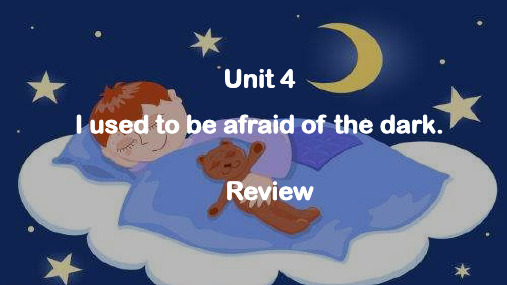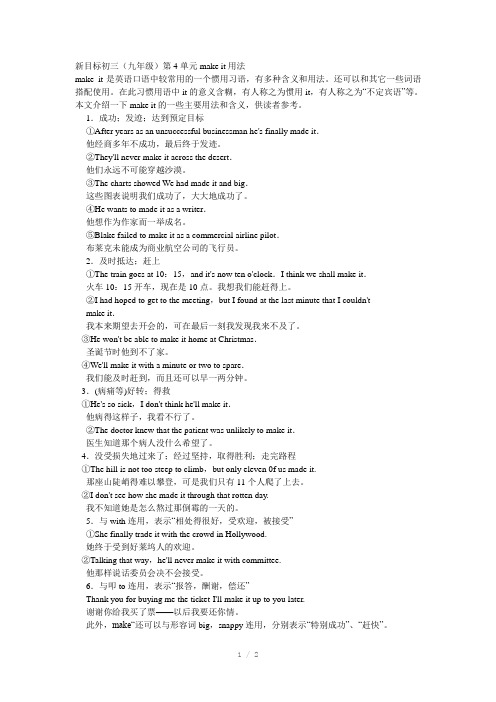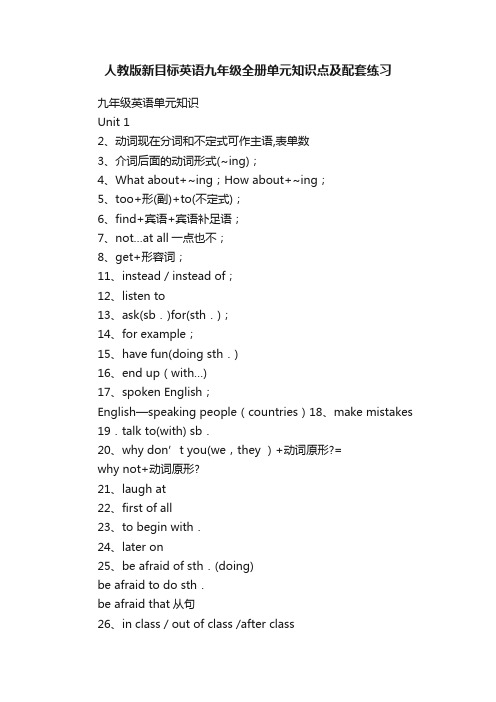新目标英语九年级第4单元知识点
新目标九年级英语第四单元重点词组

新目标九年级英语第四单元重点词组1. give the money to charity 将钱捐献给慈善机构2. put the money in the bank 存钱3. medical research 医学研究4.wear a shirt and tie 穿西装打领带5.What if 如果…怎么样?6.get nervous 紧张7.get pimples长痘痘8.take a walk散步9.take a big exam 参加大考10.too…to…太。
而不能11. be a lot of trouble很麻烦1.in public 在公共场合3. give a speech 演讲4. the whole school 全校5. without permission 未经许可6. be in a movie 演电影7. be(make) friends with 与…交朋友8. introduce myself自我介绍9. introduce…to… 把…介绍给…11. social situations 社会环境12. in the slightest 一点也,根本13. plenty of 很多的,足够的14.get along with 与… 相处; get along with someone very well 与某人友好相处15. say something bad about somebody说某人坏话16. right away 立刻,马上17. think about考虑19. be friendly to 对…友好20. at lunch time 在午饭时间21. a bit shy 有点害羞23. represent the class代表班级24. come to p in… 在… 中取得第一25. let…down让某人失望26. come up with: =to think of ( a plan, answer, reply,etc.)针对问题提出,想出(解决方法)1.have a lot of experience (in)doing sth 在做某事方面有经验e out 出版4.give advice on… 在…方面提出意见、建议5.by accident 偶然地,无意之中6.hurry to do sth 匆匆忙忙干…7.an internet friend 网友1重点句子:1、If I were you, I’d get out of here.如果我是你,我会离开这里。
2017版新目标英语九年级第四单元重点知识点归纳

2017版新目标英语九年级第四单元重点知识点归纳I used to be afraid of the dark.一、单词盘点1.humorous adj.有幽默感的 a humorous man 一个幽默的人2.humor n. 幽默a sense of humor 幽默感3.silent adj. 沉默的Keep silent !保持沉默silence n.沉默in silence 3.helpful adj. 有帮助的be helpful to…对……有帮助help n.帮助I need your help.4. score n.得分;进球get a good score取得好的成绩5. background n.背景6. interview v.采访;面试interview sb. about sth.就某事采访某人He has an interview for the manager’s job.n.面试;访谈a job interview一次工作面试n adj. 亚洲的;亚洲人的Asian countries亚洲国家Asia n.亚洲We are in Asia.8.deal v.对付;对待过去式;How to deal with so many e-mails? 过去分词dealt9.dare v. 胆敢;敢于I dare to sing in front of our class.10.ton n.吨pl. 大量;许多tons of11.private adj. 私人的;私密的12.guard n. 警卫;看守several guards 几个警卫v.守卫;保卫guard the house13.require v. 需求;要求requirement n.需求;要求14. European adj. 欧洲的;欧洲人的Europe n. 欧洲人15.Afican adj. 非洲的;非洲人的Africa n. 非洲人16.British adj. 英国的;英国人的Britain n.17.speech n. 讲话;发言give a speech; make a speech发表演说18.public n.民众adj. 公开的;公众的in public公开的;当众19. ant n. 蚂蚁复数ants20.seldom adv.不常;很少21.influnce v.影响n. 影响have an influence on ….对…有影响22.absent adj.缺席be absent from 缺席absence n. 缺席23.fail v.不及格;失败;未能做到fail to do sth.未能做成某事failure n.失败The failure is the mother of success.失败是成功之母24.examination n.考试=exam pass the examination通过考试25.exactly adv.确切地;精确地exact adj.确切的;精确的26.pride n.骄傲;自豪take pride in以……而自豪27.proud adj.自豪的;骄傲的be proud of 以……而自豪28.general adj.总的;普遍的;常规的n. 将军29.introduction n.介绍make an introduction做一个介绍introduce v. 介绍Let me introduce myself.introduction n. 说明Please read this introduction before using the new machine.二、重点短语以及句型结构1.be afraid of doing sth/ be afraid to do sth 害怕做某事,2.I’m afraid that….. 我恐怕….., I’m afraid not. 我恐怕不行。
Unit 4 (单元复习课件)-九年级英语全一册(人教新目标Go for it!)

审题 1.审主题: 我的变化 2. 审体裁: 说明文 3.审人称: 第一人称 4.审时态: 一般过去时,一般现在时 5. 审要点: 过去与现在的对比
Writing
Follow the prompts to write an article to talk about your change.
A.Even
B.Even though C.If
D.Unless
(A)4. You can made a _____ instead of him.He doesn't have to go
there_____ person.
A.decision;in B.decide;in C.decision;by D.decide;by
05 Writing
Writing
Write about how you have changed. What did you use to be like? Which change is the most important one and why?
Try to write two paragraphs. Paragraph 1: General introduction about the changes in your life Paragraph 2: The most important
Language points
Point 7.Now she’s not shy anymore and loves singing in front of crowds. not ... anymore = no more,不再 e.g:He doesn't come late anymore.
九年级(全册)英语单元知识点、短语及句型总结

Unit 1一、知识点1.2.By: ①通过…..方式(途径)。
例:I learn English by listening to tapes.②在…..旁边。
例:by the window/the door③乘坐交通工具例:by bus/car④在……之前,到……为止。
例:by October在10月前⑤被例:English is spoken by many people.3.how与what的区别:how通常对方式或程度提问,意思有:怎么样如何,通常用来做状语、表语。
what通常对动作的发出者或接受者提问,意思为什么,通常做宾语,主语。
①How is your summer holiday? It’s OK.(how表示程度做表语)②How did you travel around the world? I travel by air.③What do you learn at school? I learn English, math and many other subjects.①What…think of…? How…like…?②What…do with…? How…deal with…?③What…like about…? How…like…?④What’s the weather like today? How’s the weather today?⑤What to do? How to do it?e.g. What do you think of this book?=How do you like this book?I don’do with the matter.=I don’dealwith it.What do you like about China?=How do you like China?I do n’t know what to do next step?=I don’t know how to do it next step?㊣What good / bad weather it is today!(weather为不可数名词,其前不能加a )㊣What a fine / bad day it is today! (day为可数名词,其前要加 a )4. aloud, loud与loudly的用法: 三个词都与"大声"或"响亮"有关。
新目标初三(九年级)第4单元makeit用法

新目标初三(九年级)第4单元make it用法make it是英语口语中较常用的一个惯用习语,有多种含义和用法。
还可以和其它一些词语搭配使用。
在此习惯用语中it的意义含糊,有人称之为惯用it,有人称之为“不定宾语”等。
本文介绍一下make it的一些主要用法和含义,供读者参考。
1.成功;发迹;达到预定目标①After years as an unsuccessful businessman he's finally made it.他经商多年不成功,最后终于发迹。
②They'll never make it across the desert.他们永远不可能穿越沙漠。
③The charts showed We had made it and big.这些图表说明我们成功了,大大地成功了。
④He wants to made it as a writer.他想作为作家而一举成名。
⑤Blake failed to make it as a commercial airline pilot.布莱克未能成为商业航空公司的飞行员。
2.及时抵达;赶上①The train goes at 10:15,and it's now ten o'clock.I think we shall make it.火车10:15开车,现在是10点。
我想我们能赶得上。
②I had hoped to get to the meeting,but I found at the last minute that I couldn'tmake it.我本来期望去开会的,可在最后一刻我发现我来不及了。
③He won't be able to make it home at Christmas.圣诞节时他到不了家。
④We'll make it with a minute or two to spare.我们能及时赶到,而且还可以早一两分钟。
人教版新目标英语九年级全册单元知识点及配套练习

人教版新目标英语九年级全册单元知识点及配套练习九年级英语单元知识Unit 12、动词现在分词和不定式可作主语,表单数3、介词后面的动词形式(~ing);4、What about+~ing;How about+~ing;5、too+形(副)+to(不定式);6、find+宾语+宾语补足语;7、not…at all一点也不;8、get+形容词;11、instead/instead of;12、listen to13、ask(sb.)for(sth.);14、for example;15、have fun(doing sth.)16、end up(with…)17、spoken English;English—speaking people(countries)18、make mistakes 19.talk to(with) sb.20、why don’t you(we,they )+动词原形?=why not+动词原形?21、laugh at22、first of all23、to begin with.24、later on25、be afraid of sth.(doing)be afraid to do sth.be afraid that从句26、in class/out of class /after class27、take notes30、have trouble doing sth.31、look up32、make up a conversation.33、around the world.34、deal with35、stay(keep)+形容词36、go by37、decide(not)to do sth.40、complain about sth.41、compare sth to sth.(把…比作…);compare sth with sth.(把…与…进行比较)42、43、break off45、study for a test50、find sb./sth.+宾语补足语;find it +宾语补足语+(for sb.)to do sth.51、try one's best (to do sth.)52、with the help of sb=with one's help53、much tootoo muchUnit 21、过去常做某事:主语used to(不定式)be used to(介词)be used to(不定式)be used for sth.(doing)2、not…any more→no more;not…any longer→no longer5、复合词:a fifteen-year-old boy6、对某人而言做某事是…的:It's(形容词)for sb. to do sth.7、be able to do sth.8、give up(+ ~ing)9、afford sth.(to do sth.)10、be interested in sth.(doing.sth.)11、in front of…in the front of…12、be terrified ofbe afraid of13、go to bed(sleep)14、on the soccer team15、worry about sb.(sth.)be worried about…worry that从句16、all the time17、take a bus to(某地) = go to(某地)by bus 20、spend+time(money) on sth/(in)doing sth.)It takes(took)sb.+时间+to do sth.物cost(某人)+钱人 pay 钱 for 物。
九年级英语_unit_4虚拟语气的用法_人教新目标(Go_for_it)
虚拟语气及用法1. 语气就是我们常说的说话人说话的口气。
在汉语中,语气是由说话人说话的语调、情节等等表现出来的,动词没有任何变化。
而在英语中,除了语调之外,最主要的是动词发生变化而表示不同的语气。
在英语中语气分为三类:陈述语气、祈使语气、虚拟语气。
2. 虚拟语气:如果我们所说的不是事实,也不是要求、命令、劝告等,而只是一种假设、愿望、建议或是一种实现不了的空想就用虚拟语气。
3. 虚拟语气常用在条件句中,及其他一些从句中。
注意:条件句分两种,真实条件句和虚拟条件句。
只有在虚拟(非真实)条件句中,才用虚拟语气,而在真实条件句中,要用陈述语气。
请比较:(1)If it is sunny tomorrow , we’ll go shopping.如果明天天气好,我们将会去购物。
在这句话中,明天天气好是完全有可能实现的,并非虚拟、幻想,因此是真实条件句。
在本句中,适用“主句将来时态从句现在时态。
”(2)(如果我是你的话,我会赶上车。
)在这句话中,条件句,“如果我是你”,但事实上,我不可能成为你,这只是假设的情况,没有实现的可能。
当条件实现的可能性很小,甚至可以说没有时,就需要用虚拟语气来表示,动词发生了变化。
4. 在虚拟语气中,句子动词的时态比真实条件句中的时态后退一步即:现在时→过去时(该用现在时时,用过去时)过去时→过去完成时(该用过去时时,用过去完成时)将来时→过去将来时(该用将来时时,用过去将来时)过去将来时→过去将来完成时(该用过去将来时时,用过去将来完成时)在这一单元中,我们只要求初步接触虚拟语气的用法及结构,学习表示与现在事实相反的情况下如何体现虚拟语气。
5. “表示与现在事实相反的情况”的虚拟语气请看例句:If I were you, I would climb the hill.如果我是你的话,我就会爬山。
(注:在这个句子中,即“If I were you 中,一定用were ,而不能用was”)(这句话中,是与现在的事实相反,“现在如果我是你的话。
人教版新目标九年级英语Uni4单元复习课件U4复习课件
语法再现一:
1. used to意为“_过__去__常__常__”, 表过去的习惯 *used to +_动__词__原__形___ 2.我过去怕黑。_I_u_s_e_d_t_o__b_e_a_f_r_a_id__o_f_t_h_e_d_a_r_k. 否定句:I__d_id__n_’t_u__se__to__b_e_a_f_r_a_i_d_o_f_t_h_e_d__a_rk__. 一般疑问句:_D_i_d_y_o_u__u_s_e_t_o_b__e_a_f_ra_i_d__o_f _th__e_d_ark? 肯定回答: Yes, I did. 否定回答: No, I didn’t. 反义疑问句
2d重点短语
1、时常,有时 f_r_o_m___time__t_o__time 2、对付,应付 d__e_a__l __with 3、公开地 in _p_u_b__l_ic__ 4、为-------骄傲 be_p_r_o__u_d_ of 5、in person _亲___自___,__亲身 6、take pride in __为___--_-_-_-_--感到自豪
13、 interviewer (n.) ------_in__t_e_r_v_i_e_w (v.) 面试,采访 14、 shy (adj.) ------__s_h__y_n__e_ss (n.)害羞,腼腆 15、 speak (v.) ------__s_p__e_e__c_h (n.)讲话、发言 16 、pride (n.) ------___p_r_o__u_d_ (adj.)自豪的, 骄傲的 17、 introduce (v.) ------_in__t_r_o_d_u__c_t_i_on (n.) 介绍
You used to be afraid of the dark,_d__id_n__’t_y_o__u?
新目标英语九年级上册4单元重难点知识归纳
新目标英语九年级上册4单元重难点知识归纳Unit 4一、知识点1. if 引导的非真实性条件状语从句即虚拟语气通过动词形式的变化来表示说话人对发生的动作或存在的状态所持的态度或看法的动词形式称为语气,虚拟语气表示说话人所说的话不是事实,而是一种祝愿,建议或是与事实相反的假设等。
If 引导的条件状语从句分为真实和非真实条件句,非真实条件句应用虚拟语气。
如果要表示与现在或将来事实相反时,其虚拟语气结构为:句型条件从句主句谓语动词形式动词过去式(be动词一律用were)would+动词原形即:(从句)if +主语+动词过去式(be 动词用were), 一般过去时(主句) 主语+would+动词原形过去将来时如:If I had time, I would go for a walk.如果我有时间,我就会去散步。
(事实上我现在没有时间)If I were you, I would take an umbrella.假设我是你的话,我会带上雨伞。
(事实上我不是你)I would say no if someone asked me to be in a movie.假设有人请我当电影演员,我会表示拒绝。
(事实上瑞没有人请我当电影演员)2. pretend to do sth. 假装做某事I pretended to sleep just now.pretend to be doing sth. 假装正在干某事The students pretended to be writing when the teacher came in.pretend +从句假装… I pretended that I fell asleep.3. be late for迟到如:I am late for work/ school/ class/ party.4. a few 与 a little 的区别,few 与 little 的区别⑴ a few 一些修饰可数名词a little 一些修饰不可数名词两者表肯定意义如:He has a few friends.他有一些朋友。
新目标九年级英语四单元SectionB短语
Unit 4 Section B1.hate sb/sth讨厌某人、某物hate to do sth/doing sth讨厌做某事2.be on the soccer team在足球队3.be nervous about sth/doing sth对某事或做某事感到紧张4.a normal 15-year-old boy一个正常的十五岁男孩5.It is hard to believed that难以相信----6.cause problems引起(发)问题7.move to搬迁到move---to---- 把---搬到---8.look for寻找9.take care of=look after照顾,照料10.miss sb so much非常想念某人11.feel lonely感到孤独12.influence sb/sth影响某人、某事have influence on对---有影响13.become interested in sth/doing sth对某事或做某事产生兴趣become less interested in sth/doing sth对某事或做某事没有兴趣14.be absent from class逃课15.make friends交朋友16.advise sb to do sth建议某人做某事give sb some advice on sth/doing sth给某人提出关于某事或做某事的建议17.talk with和---交谈18.in person亲自19.take a 24-hour train乘坐24小时的火车20. a 5-hour bus ride 五小时的汽车行程21.even though尽管22.be always doing s总是在做某事th23.take pride in= be proud of以---而自豪24.have a communication with sb和某人沟通25.be active in sth/doing sth对某事或做某事积极26.be worried about担心、担忧27.make a decision作出决定28.in the last/past few years在最近的或过去的几年里29.remain/stay/keep silent保持沉默30.tell jokes讲笑话31.requir sb to do sth请求或要求某人做某事be required to do sth被要求做某事。
- 1、下载文档前请自行甄别文档内容的完整性,平台不提供额外的编辑、内容补充、找答案等附加服务。
- 2、"仅部分预览"的文档,不可在线预览部分如存在完整性等问题,可反馈申请退款(可完整预览的文档不适用该条件!)。
- 3、如文档侵犯您的权益,请联系客服反馈,我们会尽快为您处理(人工客服工作时间:9:00-18:30)。
课题:I used to be afraid of the dark教学目标:学会运用used to句型谈论自己与他人的过去习惯、爱好及经常做的事情教学重难点:used to及与used相关的词的用法主要知识点:1. use v.& n. 使用,用途→adj useful 有用的useless 无用的①use sth. to do sth . 用某物做某事Farmers use horses to do the farm work . 农民用马干农活。
② used to do sth . 过去常常,过去曾经I used to sleep in class → I didn’t use to sleep in class .I usedn’t to sleep in class .③ be used to(介词)+ n. / pron. /doing 习惯于I am used to getting up early .④be used to do sth / be used for doing sth 被用来做…The knife is used to cut apples .The knife is used for cutting apples .⑤be used as 被用作…‘介词as表示“作为…”,后常接名词English is used as a foreign language in China .⑥be used by 被…使用,介词by后面常接动作的执行者The car is used by my uncle .例--- How does Jack usually go to school ?--- He _____ ride a bike ,but now he _____ there to lose weight .A .used to ; is used to walkB .was used to ; is used to walkingC .was used to ;is used to walkD .used to ;is used to walking解析:根据题意可知,此题考查used to do(过去常常做某事),be used to doing(习惯做某事),故此题选D. 而be used to do 意为“被用来做…”2. 反意疑问句①肯定陈述句+否定提问如:Lily is a student, isn’t she?Lily will go to China, won’t she?②否定陈述句+肯定提问如:She doesn’t come from China, does she?You haven’t finished homework, have you?③提问部分用代词而不用名词Lily is a student, isn’t she?④陈述句中含有否定意义的词,如:little, few, never, nothing, hardly等。
其反意疑问句用肯定式。
如:He knows little English, does he?他一点也不懂英语,不是吗?They hardly understood it, did they?他们几乎不明白,不是吗?注:反意疑问句的答语①如果反意疑问句中的陈述部分为肯定句时,用“Yes+肯定结构”作为肯定回答;用“No+否定结构”作为否定回答--- He enjoys singing , doesn’t he? 他喜欢唱歌,是吗?--- Yes, he does. /No, he doesn’t. 是的,他喜欢。
/不,他不喜欢。
②如果反意疑问句中的陈述部分为否定句时,Yes译为“不”,No译为“是”---You didn’t go to school ,did you ?你没有去上学,是吗?--- Yes, I did . / No, I didn’t . 不,我去了。
/ 是的,我没去。
例:---Jim had nothing for breakfast this morning, _____ ?---_____ . He got up too late .A .had he; YesB .hadn’t he; YesC .did he; NoD .didn’t he; No解析:由nothing可知陈述部分为否定句,故附加疑问部分应用肯定形式,故排除B、D,本句时态为一般过去时,应用助动词did .故选C3. help v.& n. 帮助→ adj. helpful 有帮助的相关短语及句型:help sb. with sth. 在……方面帮助……help oneself to 随便吃……help sb. out 帮助某人解决困难help sb. (to ) do sth .帮助某人做某事with the help of sb = with sb’s help 在……的帮助下4. What’s sb like ? 意为“……是什么样的人?”,多用于提问人的性格、品质等,也可用于提问人的相貌。
--- What’s Alice like ?--- She is quiet and a little shy .注:What does sb look like?用来提问人的长相、外貌,意为“…..长得什么样?”--- What does Tom look like ?--- He has short hair .5. enough ①副词,意为“足够的;充分的”,用来修饰形容词或副词,一般置于被修饰词之后He runs quickly enough .②形容词,意为“足够的;充分的”,在句中作定语修饰名词,名词既可放前也可放后We have enough time to do our homework .③adj /adv +enough to do sth 意为“足够…可以做某事”The boy is old enough to go to school .6. It has been + 一段时间+since + 过去式的陈述句“自从……已经多长时间了”,还可表示为“It is +一段时间+since+从句”It has been four years since I worked in the school .注:since此处用作连词,意为“自从;自从…以来”。
主句常用完成时,且动词需用延续性动词。
Since后接从句,该从句用一般过去时态。
She has taught English since I came to this school .since 还可用作介词,意为“自从…以来”,后接表示时间点的词He has worked there since 10 years ago .例:My uncle has been taught in this school ______ he was twenty years old .A .sinceB .forC .untilD .after解析:since 引导的从句是现在完成时的标志之一。
句意为“自从他20岁起,我叔叔就一直在这所学校里教学。
”7. from time to time =sometimes 有时,时常一般现在时的标志。
8.turn 变成多用于在颜色或性质等方面的变化,强调变化的结果become 变得,成为通常指身份、职位的变化,强调变化的过程已完成get 变得多用于口语,表示一种变化过程,强调“渐渐变得”,其后常接形容词比较级The man turned blue with fear . 那个人吓得脸色发青。
She became an English teacher .In winter , the days get shorter .9. see sb. do sth . 看见某人做了某事指整个过程即:指动作经常发生或刚刚完成see sb. doing sth .看见某人正在做某事。
指当时正在进行的动作。
I saw him playing football on the playground .I saw her run into the room .例:When I came into the school , I saw some boys basketball on the playground .A playB . playingC playsD to play解析:此题考查see sb do sth 和see sb doing sth 的区别,句意为“当我进学校时,我看见一些男孩正在踢足球”,故选B类似用法的单词还有:hear sb. do sth. / hear sb. doing sth .watch sb. do sth . / watch sb doing sth .10. 19-year-old 十九岁的,这是由“数词--名词--形容词”构成的复合形容词,其中间用连字符连接,其中的名词必须用单数。
He is an eight-year-old boy .例:I don’t believe that this ______ boy can paint such a nice picture .A .five years oldB .five-years-oldC .five-year-oldD .five year old解析:根据选项直接排除B、D,又因选项A通常作表语,故选C。
C选项在句中作定语11. take up doing sth . 开始做某事,学着做某事,从事His father took up learning English at the age of forty .12. deal with 处理,应付常与how 连用, 侧重于方式、方法;do with 处理常与what 连用,侧重于对象。
I don’t know how they deal with the problem .I don’t know what they do with the problem .例—I don’t know how to with this math problem .—You can solve it listening carefully in class .A do, byB deal , byC do , inD deal , with解析:how通常与deal with 搭配,故排除A、C, 介词by意为“通过…的方式”,故选B注:在动词不定式短语to deal with 中,必须带宾语I don’t know how to deal with it .13. dare 敢于,胆敢,当情态动词时常用于否定句、疑问句或条件句中。
